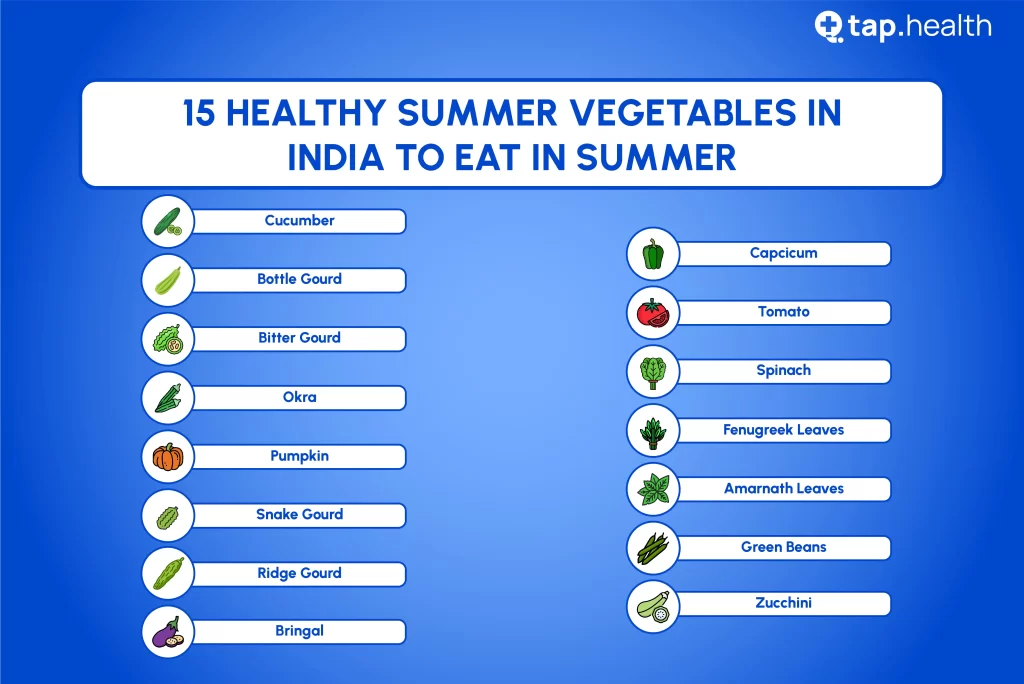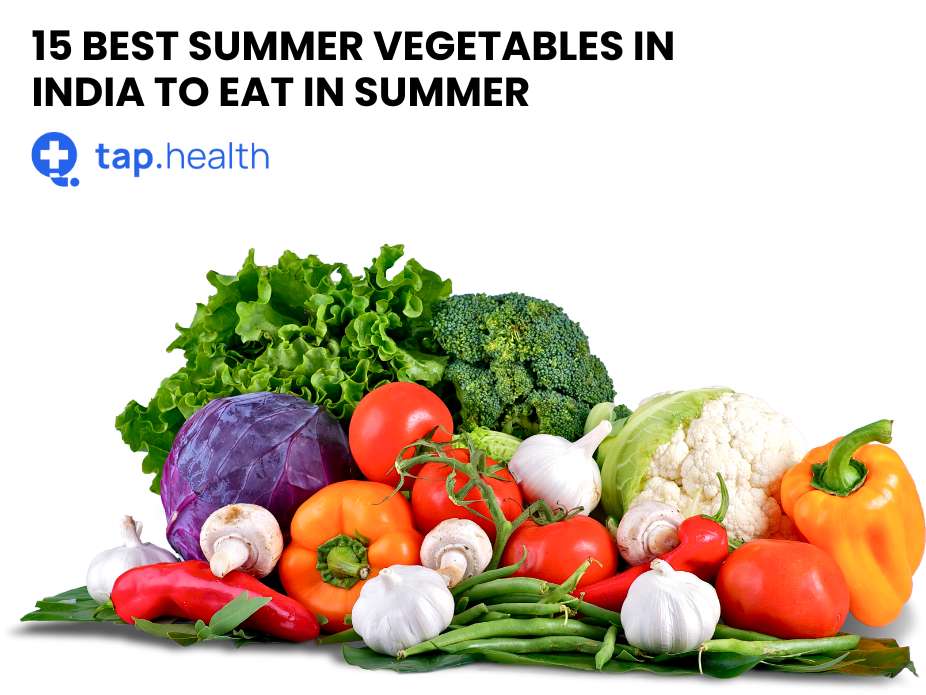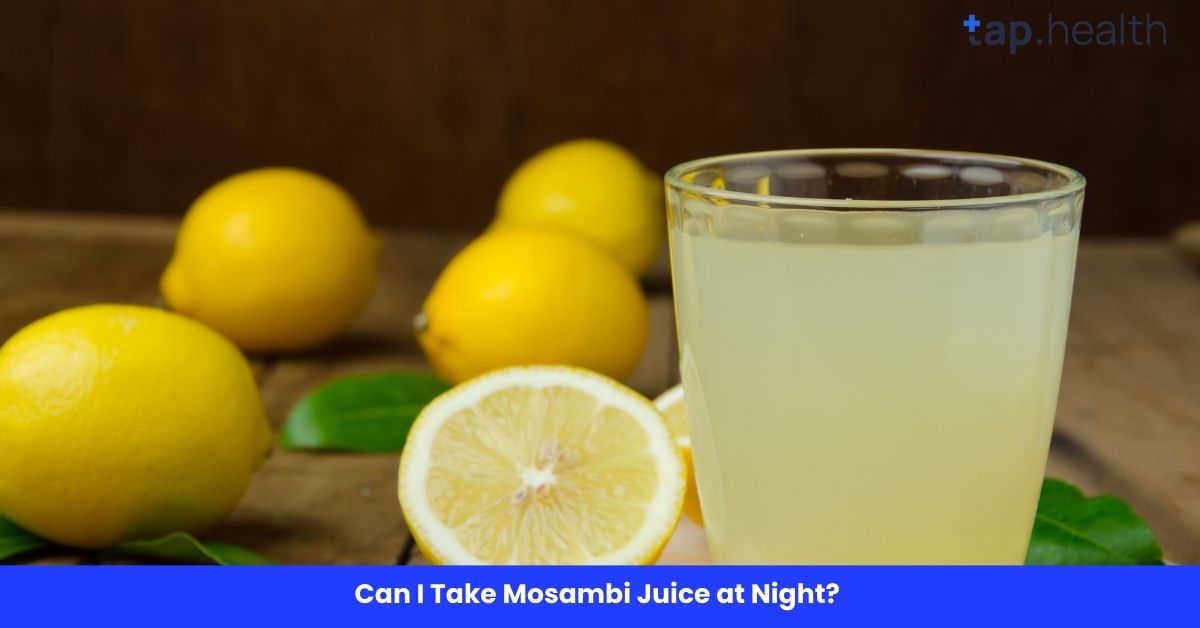Summer in India can be quite intense, with soaring temperatures and high humidity. One of the best ways to stay healthy and cool during these hot months is by including summer vegetables in your diet. These vegetables are not only nutritious but also help in keeping the body hydrated and energized. In this blog, we will explore the best summer vegetables in India and why they are essential for your diet.
Why Should You Consume Summer Vegetables in India?
Consuming summer vegetables is crucial for several reasons:
- Hydration: Many summer vegetables have high water content, which helps keep you hydrated.
- Nutritional Value: They are packed with vitamins, minerals, and antioxidants that boost your immune system.
- Cooling Effect: These vegetables have a natural cooling effect on the body, helping to regulate body temperature.
- Digestive Health: They are usually high in fiber, aiding digestion and preventing constipation.
- Low in Calories: Summer vegetables are typically low in calories, making them excellent for weight management.
Including these vegetables in your diet can help you stay healthy and comfortable during the scorching summer months.
15 Best Summer Vegetables in India to Include in Your Diet

1. Cucumber (Kheera)
Cucumbers are a summer staple in India. They have high water content and are great for hydration. Cucumbers are also rich in vitamins K and C and are low in calories, making them perfect for weight loss.
2. Bottle Gourd (Lauki)
Bottle gourd is known for its cooling properties. It is rich in vitamins C and B, calcium, and magnesium. It helps in digestion and is excellent for maintaining a healthy heart.
3. Bitter Gourd (Karela)
Bitter gourd might not be everyone’s favorite due to its bitter taste, but it is incredibly healthy. It helps in regulating blood sugar levels, making it beneficial for diabetics. It is also rich in vitamins A and C, and iron.
4. Okra (Bhindi)
Okra, or ladyfinger, is a nutritious vegetable rich in fiber, vitamin C, and folate. It is known to improve digestion, control blood sugar levels, and boost immunity.
5. Pumpkin (Kaddu)
Pumpkin is a versatile vegetable that can be used in various dishes. It is rich in vitamin A, which is good for eyesight. It also has antioxidant properties and is low in calories.
6. Snake Gourd (Chichinda)
Snake gourd is a cooling vegetable that is rich in dietary fiber, vitamins A and C, and minerals like calcium and magnesium. It aids in digestion and helps in detoxifying the body.
7. Ridge Gourd (Turai)
Ridge gourd is a light and easily digestible vegetable. It is rich in dietary fiber, vitamins C and A, and minerals like zinc and iron. It helps in keeping the liver healthy and promotes weight loss.
8. Brinjal (Baingan)
Brinjal, also known as eggplant, is a popular vegetable in Indian cuisine. It is rich in antioxidants, vitamins, and minerals. Brinjal helps in controlling blood sugar levels and has heart-healthy properties.
9. Capsicum (Shimla Mirch)
Capsicum, or bell pepper, is a colorful vegetable rich in vitamins A and C. It has antioxidant properties, boosts immunity, and is low in calories, making it excellent for weight management.
10. Tomato (Tamatar)
Tomatoes are juicy and refreshing, perfect for summer. They are rich in vitamins C and K, potassium, and antioxidants like lycopene. Tomatoes are great for heart health and skin.
11. Spinach (Palak)
Spinach is a leafy green vegetable that is highly nutritious. It is rich in iron, calcium, vitamins A and C, and antioxidants. Spinach helps in boosting immunity, improving eyesight, and promoting healthy skin.
12. Fenugreek Leaves (Methi)
Fenugreek leaves are a common ingredient in Indian cuisine. They are rich in fiber, vitamins A and C, and minerals like iron and magnesium. Fenugreek leaves help in controlling blood sugar levels and improving digestion.
13. Amaranth Leaves (Chaulai)
Amaranth leaves are highly nutritious and rich in vitamins A and C, iron, and calcium. They help in boosting immunity, improving digestion, and maintaining healthy skin and hair.
14. Green Beans (Phalli)
Green beans are low in calories and high in fiber, making them great for weight loss. They are rich in vitamins A, C, and K, and minerals like iron and magnesium. Green beans help in improving digestion and boosting heart health.
15. Zucchini (Turai)
Zucchini is a versatile summer vegetable that can be used in a variety of dishes. It is rich in vitamins A and C, potassium, and antioxidants. Zucchini helps in improving digestion, boosting immunity, and promoting healthy skin.
Take Home Points
Including summer vegetables in your diet is essential for staying healthy during the hot months in India. These vegetables are packed with nutrients, have high water content, and provide numerous health benefits. From hydration to digestion and overall health, these vegetables play a crucial role in keeping your body cool and nourished. Make sure to include a variety of these vegetables in your meals to reap their full benefits.
FAQ on Summer Vegetables in India
1: What are the best vegetables to eat in summer in India?
The best vegetables to eat in summer in India include cucumber, bottle gourd, bitter gourd, okra, pumpkin, snake gourd, ridge gourd, brinjal, capsicum, tomato, spinach, fenugreek leaves, amaranth leaves, green beans, and zucchini.
2: How do summer vegetables help in staying hydrated?
Summer vegetables like cucumber, bottle gourd, and tomatoes have high water content, which helps in keeping the body hydrated and maintaining fluid balance.
3: Are summer vegetables good for weight loss?
Yes, most summer vegetables are low in calories and high in fiber, making them excellent for weight management.
4: Can summer vegetables help in digestion?
Yes, many summer vegetables are rich in dietary fiber, which aids in digestion and prevents constipation.
5: How can I include these vegetables in my diet?
You can include these vegetables in salads, soups, curries, stir-fries, and smoothies. They can be cooked in various ways to make your meals healthy and delicious.
References
Fruits and Veggies to Eat this Summer
WHICH VEGETABLES ARE IN SEASON IN SUMMER? GLOBAL RECIPES WITH SUMMER VEGETABLES



